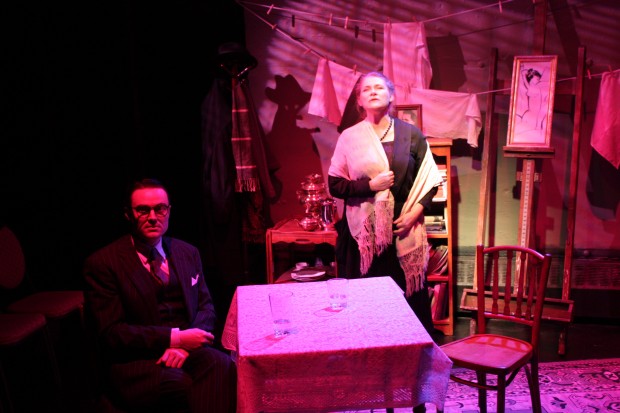 “Anna: Love in the Cold War†by Nancy Moss is a play that proves that sometimes one long conversation can reveal both the history of a particular person and the life of a whole nation during a certain period of time. Produced in Honolulu by The Actors Group, “Anna†won a statewide award for Best Original Script. For that reason alone, the performance is a must-see, whether or not Russian culture and history interests or fascinates you.
“Anna: Love in the Cold War†by Nancy Moss is a play that proves that sometimes one long conversation can reveal both the history of a particular person and the life of a whole nation during a certain period of time. Produced in Honolulu by The Actors Group, “Anna†won a statewide award for Best Original Script. For that reason alone, the performance is a must-see, whether or not Russian culture and history interests or fascinates you.
The first thing that impresses you in director Joshua Kashinsky’s production is the professionalism of the actors. Both Anna (April Woodall) and her late-hour visitor, Isaiah Berlin (Matt Cody), come alive; their words and gestures complete each other. Their emotions are clearly reflected on their faces, and they seem so natural that you feel that you are there in that room, too.
The plot is absolutely brilliant. The characters are two real people, a famous Russian poet, Anna Akhmatova, and a Jewish immigrant, whose family moved to England when he was a child. They met in person in Leningrad in 1945, and the play is based on that historical meeting. While the two lonely people open up to one another, we learn how hard it was to live in Russia under Stalin’s regime when neighbors spied on each other and the government always knew what everyone did, spoke and even thought about. During times like that, no one feels safe even within his or her own house.
A part of this is put into words; some is shown through actions, and a lot of it is implied and can be understood later or through Anna’s poetry, translated by Judith Hemschemeyer.
The cultural aspect of the play is another success. There are a few moments in the play where Russian mentality is reflected quite precisely. For instance, when Anna says, “Russia is the place to explore one’s soul,†we know that this is what bothers every Russian. Soul is the key notion for this culture, and searching for his or her own identity through soul is a journey Russian people are always looking forward to.
In addition to this, there is plenty of information about Russian poets of the Stalin’s epoch scattered around the play. Anna mentions a lot of writers who suffered and even died for their work, like Osip Mandelstam and Nikolay Gumilev, Anna’s ex-husband. We find out that she herself wasn’t allowed to publish her poems for a long time, about 20 years. Even though she was a banned poet in her homeland, she had no intention of leaving Russia, first of all, because she was afraid for her son, Lev Gumilev, and secondly, because she felt she needed to write about these years, for generations to know; otherwise, it would all be lost in history.
It seems that since the content of the dialogues is quite complicated, someone who is not familiar with Russian history and culture will be bored watching the play. On the contrary, the playwright and the director do such a great job that whatever is not clear at first will always be explained in a phrase or two later. For instance, when Anna looks at a picture on her shelf and exclaims, “Oh, my Lev,†one may think that she talks about her husband. However, she soon clarifies it mentioning that he is her son, that the Soviets kept him in jail for a while and that they threaten to arrest him again if she makes a wrong move or writes something that will outrage Stalin. This fits perfectly into the plot, as Anna’s guest is a foreigner himself, even though he was born in Russia, and what Anna says to him often needs to be explained further.
As far as the setting is concerned, all the action takes place in one room of Anna’s house. Occasionally, one of the characters comes outside for a purpose, giving the other one a moment alone with the audience. Since the setting is intimate, there is a spark, some chemistry that appears between the two, the man who adores Anna for her poetry, and the lonely woman who is distressed, but determined to go on with her writing, and they kiss.
As the viewers are looking forward to the continuation of the affair, it’s suddenly light outside, and the guest has to go, since many people can see him and report to the government that Anna was entertaining a British spy. At the end of the play, there is a phone conversation, in which Anna tells Isaiah that she can never see him again, for her and her son’s safety, which puts an end to the spark of love that was there during that late night meeting.
All in all, a wonderful piece of historical fiction, “Anna: Love in the Cold War†gives every spectator something to admire. For some, it will be the cultural and historical aspects; others will remember the flawless acting. But they will all equally enjoy the artfulness of this short play that brings about a lot of thoughts about life and love and the poetry that is now almost a century old.
Photo by VALÉRIE THÉRÈSE BART

Leave a Reply